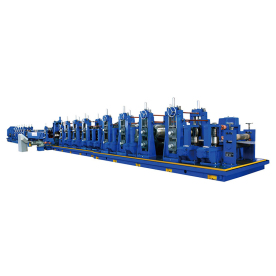[Precision induction heating equipment]The Future of Manufacturing: How Precision Induction Heating Equipment Revolutionizes Metalworking and Material Processing Industries
News 2025-1-26
Induction heating has emerged as a transformative technology in the realm of metalworking and material processing. As manufacturers strive for efficiency and precision in their operations, precision induction heating equipment has become a cornerstone of innovation. This technology allows for the heating of metal workpieces to high temperatures in a fraction of the time required by traditional methods, minimizing energy consumption and enhancing product quality. In this article, we delve into the intricacies of precision induction heating, its applications, advantages, and the role it plays in revolutionizing the manufacturing landscape.
Induction heating operates on the principle of electromagnetic induction, where an alternating current passes through a coil to create a magnetic field. When a conductive material, such as metal, is placed within this field, eddy currents are induced within the material, generating heat. This process allows for rapid and localized heating, making it an excellent choice for various applications, including hardening, brazing, forging, and melting.
One of the key advantages of precision induction heating equipment is its ability to deliver consistent results. Unlike traditional heating methods, which may heat the entire workpiece or require extensive setup time, induction heating focuses on specific areas, minimizing the risk of overheating and ensuring uniform temperature distribution. This precision is particularly beneficial in applications that require tight tolerances and specific metallurgical properties.
In the automotive industry, for instance, precision induction heating equipment is used to harden gears and other critical components, enhancing their wear resistance and extending their lifespan. By using induction heating for tempering or hardening, manufacturers can achieve superior mechanical properties that are crucial for high-performance vehicles. The ability to control the heating process precisely also allows for the optimization of microstructure, ensuring that components can withstand extreme conditions without failure.
The aerospace sector is another area where precision induction heating equipment plays a crucial role. Components subjected to high levels of stress, such as turbine blades, require exceptional material properties. Induction heating enables manufacturers to achieve the necessary material characteristics while reducing process times. Additionally, by minimizing oxidation, manufacturers can enhance the integrity of components, which is vital in the aerospace industry, where safety is paramount.

The Future of Manufacturing: How Precision Induction Heating Equipment Revolutionizes Metalworking and Material Processing Industries

The Future of Manufacturing: How Precision Induction Heating Equipment Revolutionizes Metalworking and Material Processing Industries
Despite the numerous benefits, the implementation of precision induction heating equipment requires a strategic approach. Manufacturers must invest in high-quality systems and training to ensure that operators understand the intricacies of the technology. Additionally, calibration and maintenance are critical to maximizing performance and achieving the desired outcomes.

The Future of Manufacturing: How Precision Induction Heating Equipment Revolutionizes Metalworking and Material Processing Industries
In conclusion, precision induction heating equipment is revolutionizing the metalworking and material processing industries by providing a solution that combines speed, efficiency, and precision. Its diverse applications range from automotive to aerospace and electronics, each benefiting from the enhanced characteristics that induction heating provides. As manufacturers look to the future, investing in this innovative technology will undoubtedly play a pivotal role in achieving greater productivity, sustainability, and product quality. The rise of precision induction heating is not just a trend; it's a paradigm shift that is reshaping the landscape of manufacturing.
